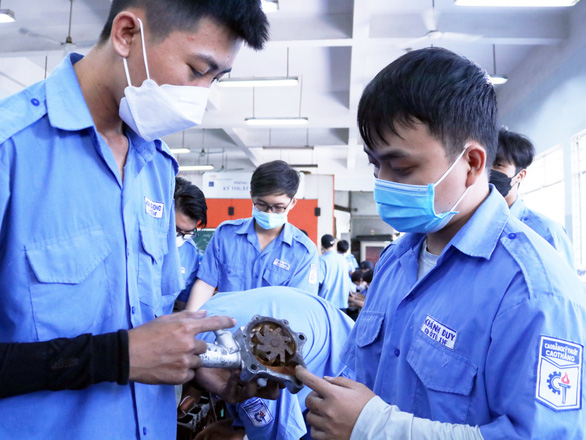After being hit by the COVID-19 pandemic for two years, the shortage of workers in some countries, such as Japan, South Korea and Germany, has been more severe as they cannot recruit staff from other countries, including Vietnam.
As nations have restored near-normal travel and immigration policies, junior colleges and vocational schools in Vietnam immediately received suggestions to send human resources overseas.
Desperately seeking laborers
Vo Thi My Van, rector of Saigontourist Hospitality College, said the college signed an exclusive agreement with a large French group regarding the supply of workers in culinary arts, baking, reception, and catering earlier this year.
The school’s students may work in France after graduation. French-language skills are required for the positions of receptionists and waitpersons.
The starting salary, excluding all expenses, is €1,670 (US$1,787) per month. After two working years, the salary will increase.
Employers in France will pay for subsistence allowances, including lodging, food, and traveling costs.
Van added the benefits were quite attractive, especially for new graduates. Nevertheless, the number of graduates interested in such working opportunities remains modest.
The college’s partner set a target that it would send around 200 candidates to France in the summer of 2022, but the school had received only 50 applications as of May, of which 20 have been approved.
Dr. Hoang Van Phuc, rector of Bach Khoa Sai Gon College, said a group of final-year students of the college’s auto technique and technology faculty would take part in a paid program in Japan.
The program was resumed after two years of suspension due to the coronavirus pandemic.
Students will practice in enterprises and factories for 10-12 months, receive salaries, and have their subsistence allowances and air fares paid.
“Not only enterprises in Japan, those from South Korea and Taiwan have paid much attention to Vietnamese vocational schools’ graduates after the pandemic," Phuc said.
“However, the number of students sent abroad has been small.
"Only 30 students may travel to Japan in October."
Hindrances
Nguyen Khanh Cuong, rector of Lilama 2 International Technology College in Dong Nai Province, said through international cooperation agencies, the college and some German businesses had launched multiple projects to send students of technical majors to Germany for work.
The starting salary was competitive, at some €3,000 ($3,200) per month, but students failed to meet the high demand of partners.
In each 'Road to Work in Germany' program, the college receives 15-20 students’ applications, which is modest.
Cuong explained that although the requirements in career skills and knowledge were not strict, many students found the German language an obstacle.
They were asked to reach the B1 level of German in the Common European Framework of Reference for Languages.
“Many students are good in techniques but are not cut out for languages. Some do not strive to learn German, while others believe that German is hard so they hesitate to learn it,” the rector said.
According to Dr. Dong Van Ngoc, rector of Hanoi Mechanical and Electrical College, instead of going abroad, many students preferred working near their homes or in large cities in Vietnam.
The tradition of living near families has made many students hesitate when making decisions to work abroad.
If the monthly salary when working in other countries is some VND30 million ($1,300), the young do not find it attractive in comparison with working in large local cities for VND15 million ($644.6) monthly or working in their homeland for VND10 million ($429.7).
In addition, many partners, despite facing a severe shortage of laborers, still set out stringent requirements for applicants. Contracts between colleges and recruiters tend to include many specific criteria.
Aside from skills, knowledge, and languages, companies require candidates to have good attitudes and knowledge about their countries’ culture.
Professional behavior required
A training expert at the German Agency for International Cooperation told Tuoi Tre (Youth) newspaper that students of Vietnamese vocational schools were hard-working and studious, and were not fearful of hardship.
However, the majority of them have no professional working behavior and skills to work in an international environment.
Meticulousness, carefulness, and communication and behavior skills are not found among some Vietnamese students.
Long-term strategy
Dr. Dong Van Ngoc, rector of Hanoi Mechanical and Electrical College, said the young had their own development plans after graduating from colleges and vocational schools.
Some might find it appropriate to work for domestic companies, while others might prefer going abroad to experience the high technical abilities of foreign companies.
“Therefore, students should determine their best roads as early as possible," he advised.
"If they choose to work overseas, they should know what they need to learn, how they will improve themselves, and especially what they would do next after working abroad.
"The benefits in other countries are not the decisive factor."
Like us on Facebook or follow us on Twitter to get the latest news about Vietnam!


















































